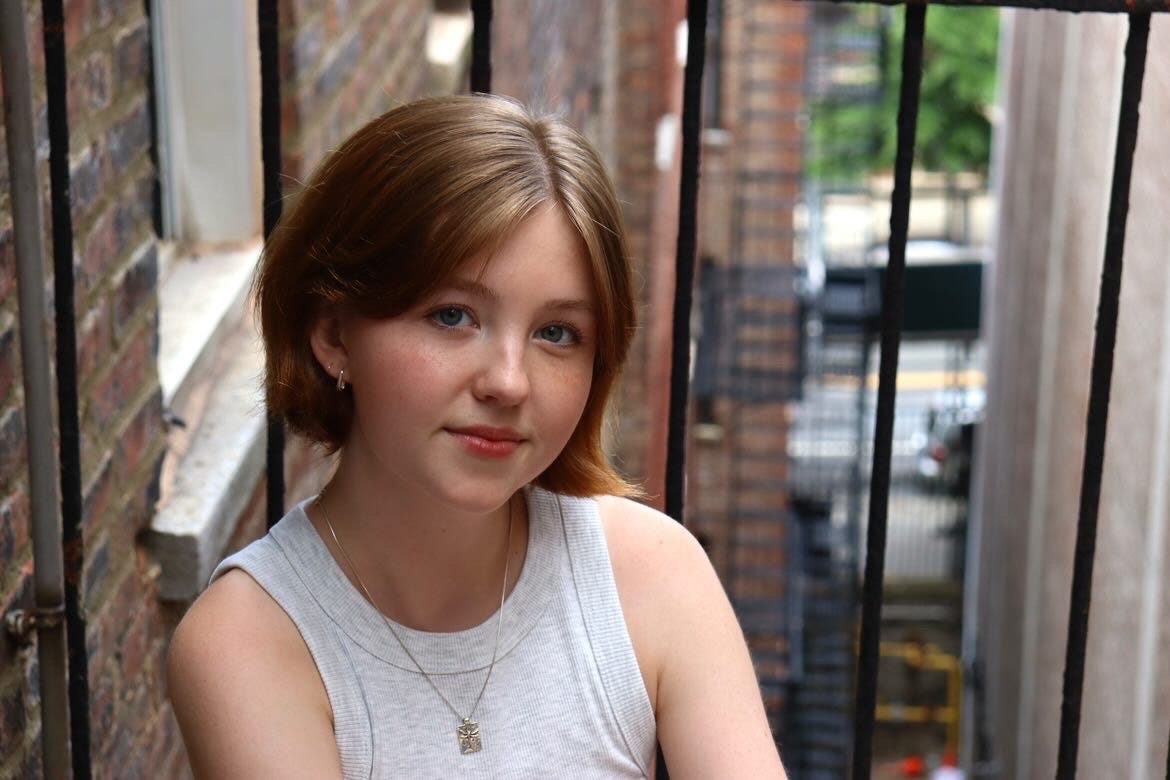Introduce yourself.
My name is Maya Shore and I use she/her pronouns. I’m going into my senior year at Barnard College. I am a playwright, director, producer, and production assistant.
What’s your current work in progress?
I am currently working on a new play, titled Fear It, that weaves together and rips apart the stories of Shakespeare’s daughters, exposing the performance of girlhood and femininity throughout his canon. Fear It is a gutsy and innovative project that deconstructs and performs Shakespeare’s words with a new purpose. The project is set to be performed at the Glicker-Milstein Theatre the weekend of October 25th. To follow along on the project, you can follow @fearit_kcst or @mayaeshore on Instagram.
Solar Flare is an ode to light and warmth and focuses on nostalgia. Has nostalgia ever served as an inspiration for you?
Nostalgia has been at the center of many of my projects. Last Fall, I wrote and directed a short play, titled There Runs a Mouse, which focuses on childhood abandonment and fairytales. Throughout the process, the cast, designers, and myself pulled on our own experiences from childhood –from the games we used to play to the smell of our favorite baked goods. Within the space of abandonment, we wanted to try to rebuild the character’s childhood through fairy tales and the memories they bring to her. How can this warmth of nostalgia change your present?
What themes do you find yourself exploring in your work?
I find myself exploring how family conflict affects childhood and the development of self. I like to see how our current selves are tied to our childhood selves.
Within this development of self, I find myself exploring what being alone does to a person. At any age, being alone–whether chosen or not–affects how we function and interact with others. I’m interested in how we grow new connections with people from a space of emotional or physical isolation.
And, in almost all my work, I love to explore the boundaries of reality.
What does your writing process look like? What inspires you, how do you draft, what constitutes a script as “finished?”
When I write, I make a folder with multimedia that reminds me of the piece I’m writing. Whether this is a page of quotes, images, or songs, I find that having other forms of art around me that try to capture the general energy or moment of a scene can be very helpful. Sometimes, I make individual folders for characters to help me understand who they are, writing out all the details I can think of for them and keeping track while I write. I try to think of things that may not even be included in the script, but for myself–such as the first movie that made them cry or a book series they had an obsession during their middle school years. I find this form of “collecting” very helpful and makes me feel more comfortable in the world. When I’m writing, I go through many many drafts where I write just about every different idea I have for how the play could go. When I think of an idea, I don’t let it go unwritten. Even if it will end up in the trash right after, there is always something new I find out from writing that draft.
I’m unsure if I ever see a script as “finished,” I see it as constantly living and changing. Every time an actor or director takes up the script, they are molding it to their vision. So, I guess I see my part of the script as “finished” when it passes from my hands to another.
How does theatrical writing differ from forms like fiction or poetry? What does theatre give you access to that prose doesn’t?
I initially was a fiction writer, but I transitioned to playwriting around two years ago. I like how playwriting gives you access to a whole space where people will be a part of your work. It’s not just your writing that is the art, but the acting, direction, lighting, sound, scenery, and more. When you write a play, you are building a future community of artists to bring your words to life. Even more, you get to share it with new people night after night. Theatre gives you access to the human connection that prose didn’t allow me.
Where would you like your writing to take you in the future?
While I would love to see my writing on Broadway like many playwrights, I write to build a community of fellow artists. I hope that my writing can take me to new opportunities and friends. Theatre is not an isolated form of art, it's an experience you have alongside others.




